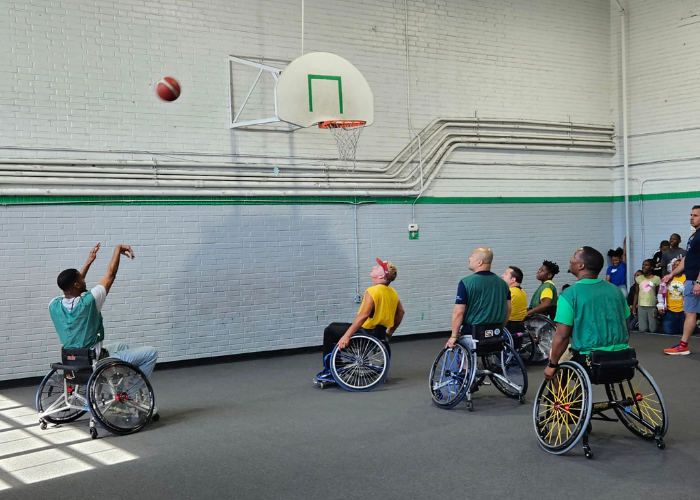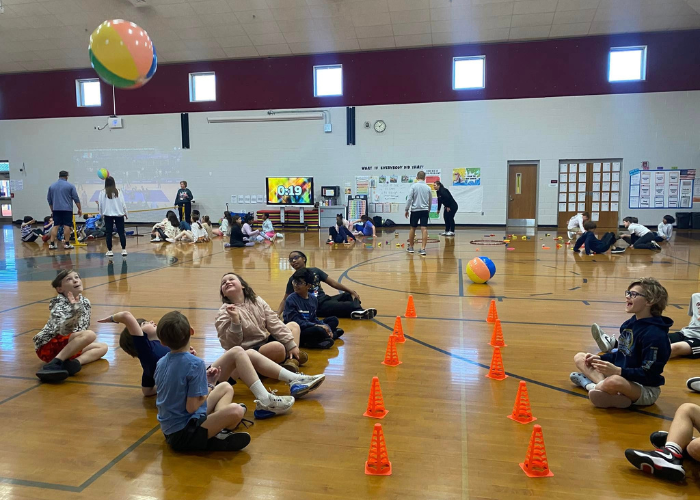By Penny Edwards and Alex X. Martinez
Need help hosting your own adapted sports demo? Just want to chat? Contact us or check out our Menu of Services.
Hosting an adapted sports demonstration at a school provides a unique opportunity to promote disability inclusivity, raise awareness and celebrate the abilities of all students. By showcasing adaptive sports, we can engage students in meaningful activities that emphasize teamwork, empathy and equal opportunities for everyone, regardless of their abilities.
This event not only allows students with disabilities to demonstrate their skills and abilities but also helps their peers better understand the importance of accessible sports and physical activities. It’s a chance for an entire school community to come together, learn and support one another.
Hosting adapted sports demonstrations in your school offers several benefits:
- Allows everyone to participate: Adapted sports provide opportunities for students with disabilities to engage in physical activities alongside their peers, promoting a culture of disability inclusion and acceptance.
- Raises awareness: It helps raise awareness about the challenges faced by individuals with disabilities and educates students on the importance of adapted equipment, modifications and accessibility in sports.
- Encourages empathy and understanding: Students will develop a deeper sense of empathy and understanding for people with disabilities, leading to greater social cohesion and respect among peers.
- Supports physical and mental health: Adapted sports can enhance physical health, improve motor skills and increase self-esteem for students with disabilities, while also offering opportunities for fun and social interaction.
- Builds community: Adapted sports demos can create an opportunity for the entire school to come together, whether through participation, volunteering or simply showing support for their peers with disabilities.
- Empowers students: Both students with disabilities and their peers gain confidence and empowerment through participation, helping to break down barriers and misconceptions around disability.
- Fosters teamwork and leadership: Hosting such events encourages teamwork, collaboration and leadership skills among students, especially when they work together to organize and support the event.

The Power of Sports and Disability Representation
Adapted sports play a crucial role in promoting participation and enriching the lives of children with disabilities. Here’s how:
Physical Health and Well-being: Adapted sports provide children with disabilities the opportunity to engage in physical activities that improve their health and well-being. Participation in sports can enhance cardiovascular health, muscle strength, coordination and overall fitness levels.
Social Interaction and Teamwork: Engaging in adapted sports allows children with disabilities to develop social skills and build relationships with peers. Team sports promote collaboration, communication and mutual respect among teammates.
Sense of Achievement and Confidence: Successfully participating in sports activities, adapted to their abilities, gives children with disabilities a sense of achievement and boosts their self-confidence. It reinforces their capabilities and encourages them to pursue new challenges both within and outside of sports.
Educational Opportunity for Spectators: Spectators, including children and adults, benefit from observing adapted sports. It educates them by demonstrating that individuals with disabilities can actively participate and excel in sports with appropriate adaptations. This firsthand experience challenges stereotypes and promotes a more inclusive mindset.
Peer Learning and Role Modeling: Children who observe adapted sports are more likely to adopt disability inclusive behaviors and attitudes towards their peers with disabilities. They learn valuable lessons about empathy, acceptance and the importance of accommodating diverse needs in recreational and social settings.
Community Engagement and Recreation: Introducing adapted sports into community programs encourages broader participation and engagement among children with disabilities. It provides them with ongoing opportunities for recreation, skill development and social interaction outside of school settings.
Adapted sports not only benefit children with disabilities by promoting physical health and social integration but also serve as a powerful educational tool for promoting disability inclusion within communities. By emphasizing accessibility and involving individuals with disabilities in the planning and implementation of sports activities, an adapted sports demo can create more welcoming and supportive environments where everyone can thrive and participate equally.

How to Host Adapted Sports Demos in Schools
Here is a detailed guide on how to plan, organize and execute such an adapted sports demo effectively:
Planning and Preparation
- Define Objectives:
- Clearly outline the goals of the event, such as promoting disability inclusivity, highlighting adaptive sports, and fostering understanding and acceptance among students.
- Select Sports:
- Choose a variety of sports that cater to different interests and abilities. Include both traditional sports and adapted sports for students with disabilities.
- Seek Funding:
- Identify sources of funding to cover expenses such as equipment, venue rental and promotional materials.
- Partnerships:
- Partner with local organizations, disability support groups or sports associations that specialize in adapted sports to enhance expertise and resources.
- Select a Team:
- Highlight the roles of staff and volunteers who will contribute to the event, including event coordinators, coaches and volunteers with experience in adapted sports.
Engaging Stakeholders
- Involve Students, Teachers and Administration:
- Engage students in the planning process to build excitement and ownership. Seek support from teachers and administrators to integrate the event into the school’s curriculum and extracurricular activities.
- Collaborate with Physical Education Teachers:
- Work closely with physical education teachers to incorporate the sports demo into their lessons. This ensures all students have the chance to learn about and participate in sports.
Accessibility and Adaptations
- Venue Accessibility:
- Ensure that the event venue is fully accessible to participants with disabilities. This includes wheelchair access, accessible parking and restroom facilities.
- Adapted Equipment and Rules:
- Provide adapted equipment as needed for different sports. Modify rules or provide alternative methods of participation to accommodate varying abilities.
- Training Volunteers:
- Train volunteers and staff on disability inclusive practices, handling adaptive equipment and interacting sensitively with participants with disabilities.
Promotion and Participation
- Promotion:
- Use various channels such as posters, announcements, school newsletters and social media to promote the event.
- Encourage Participation:
- Create a welcoming atmosphere where students feel encouraged to participate in sports demonstrations and activities.
Event Implementation
- Orientation and Expectations:
- Before the event, explain the rules, equipment and expectations for participants and spectators. Foster an atmosphere of respect.
- Learning Opportunities:
- Provide educational opportunities during the event, such as demonstrations of adaptive equipment and discussions on the benefits of disability inclusive sports.
Providing Resources
- Equipment Packages:
- Discuss resources and equipment packages available for schools interested in integrating adapted sports into their regular sports programs.
Celebrate Success
- Highlight Achievements:
- Share success stories of athletes who have overcome challenges or achieved milestones in adapted sports.
- Recognize Participation:
- Acknowledge the efforts and sportsmanship of all participants, emphasizing teamwork and inclusivity.
Feedback and Reflection
- Gather Feedback:
- Collect feedback from participants, volunteers, teachers and spectators to evaluate the impact of the event and identify areas for improvement.
- Reflect and Plan:
- Reflect on the event’s success and lessons learned. Use insights to plan future initiatives that sustain disability inclusivity in school sports.
Follow-up and Integration
- Ongoing Support:
- Provide ongoing support and resources for students interested in continuing with adapted sports beyond the event.
- Integration into Curriculum:
- Incorporate lessons and experiences from the sports demo into regular PE classes and extracurricular sports programs to maintain inclusivity and diversity awareness.
- By following these steps and fostering a culture of disability inclusion, schools can create a lasting impact that extends beyond the event itself. Including students with disabilities in sports empowers students of all abilities and cultivates an environment where everyone feels valued and respected.
Resources:
Secondary Benefits of Adapted Sports and Recreation – NCHPAD
Home – American Association of Adapted Sports Programs®
AAASP Resource Center – American Association of Adapted Sports Programs®
